Digital Ocean vs WP Engine: Final verdict
Looking over DigitalOcean vs. WP Engine, it’s clear why both hosts are so popular. They have both hosted millions of
websites that run on WordPress for decades, building up a loyal customer base.
-
WP Engine (Overall grade: 8.6)
stands out with its specialization in WordPress hosting, offering optimized performance, security, and an array of tools geared towards developers and agencies. It’s an ideal choice for WordPress users due to its EverCache® technology, excellent uptime, and proactive security measures, including DDoS mitigation and managed core updates. WP Engine also excels in customer support with 24/7 live assistance via chat and phone, making it a reliable option for users who need consistent and expert help. However, its relatively higher cost might be a deterrent for smaller projects or budget-conscious users.
DigitalOcean(Overall grade: 8.3)
is known for its simplicity, transparent pricing, and a comprehensive suite of hosting options including VPS and cloud hosting, making it a versatile choice for developers and small businesses. It provides excellent real-time monitoring, customizable alerts, and supports a variety of frameworks and languages, catering well to technical users seeking flexibility. While it lacks some of the tailored WordPress features and premium support of WP Engine, DigitalOcean remains a cost-effective and reliable solution, particularly for those looking for a scalable and customizable hosting environment.
 Overall grade:8.3 |
 Overall grade:8.6 |
|
|---|---|---|
| Uptime and Availability | 9.2 | 9.6 |
| Hosting Performance | 8.8 | 9.1 |
| Hosting Security | 9.1 | 9.4 |
| Price | 8.7 | 8.1 |
| Hosting Features | 6.9 | 6.8 |
| Ease Of Setup | 8.2 | 8.3 |
| User Management | 8.0 | 8.8 |
| Customer Support | 7.8 | 8.9 |
| User feedback | 4.6/5 | 4.6/5 |
Hosting Types Offered
Both platforms provide a variety of hosting types, each designed to meet the different needs of users.
 |
 |
|
|---|---|---|
| Shared hosting | ||
| Cloud hosting | ||
| WordPress hosting | ||
| Ecommerce hosting | ||
| VPS hosting | ||
| Dedicated hosting |
Although both offer a variety of hosting plans tailored to different needs, in certain cases, one platform may prove to be more suitable.
Detailed comparison
Uptime and availability
Evaluates the average uptime statistics, uptime guarantee and overall availability of the hosting
provider
Score Components:
- Uptime percentage (30%): evaluates the uptime statistics in given period of time
- Uptime guarantee (20%): Assesses if the platform offers an uptime guarantee and
whether the actual uptime matches the promised guarantee. - General performance (25%): Evaluates how fast is the average response time and overall
it’s stability. - Responsiveness (10%): Adaptability to different devices and screen sizes.
- Availability (25%): Reflects the total downtime and number of outages.
 9.2
9.2
 9.6
9.6
🏆 Winner
WP Engine: WP Engine offers unparalleled uptime and availability with top-tier performance metrics.

DigitalOcean provides robust real-time monitoring and customizable alerts for endpoints across multiple global regions. It promises a 99.99% uptime SLA, supported by state-of-the-art infrastructure and multiple data centers for optimized performance. The service also includes automated backups, advanced security measures, and flexible hosting options tailored to various frameworks and languages.
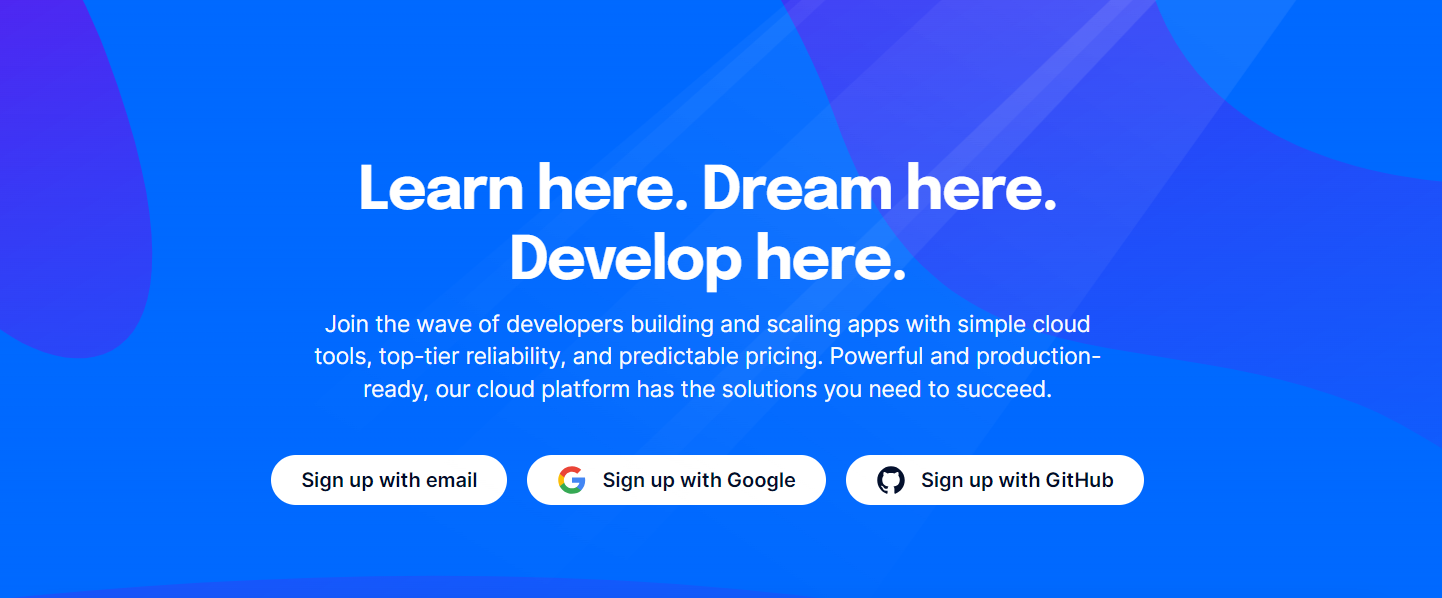
WP Engine excels with 24/7 uptime monitoring and remarkable performance metrics, including a 100% uptime over a two-month period and superior server response times. With a 99.99% SLA, proactive security measures, and a comprehensive global data center network, WP Engine ensures high reliability and low latency. The platform’s excellent customer support and proactive maintenance further enhance its top-tier service.
Which one has better hosting performance?
Score Components:
- Hosting speed (30%): This includes SSD quality, Load times, PageSpeed score ranges,
additional information on website speed, built-in plugins for performance enhancement, available caching
methods, and CPU/RAM options - CDN (20%): Considers whether CDN is available or not, whether it’s free or paid, and
the quality of the CDN service - Available data centers (30%): Evaluates the number of data centers and their locations
globally. - Scalibility (20%): Looks at whether elastic scaling is available, the process required
to scale (manual upgrade vs. automatic scaling), the presence of dedicated servers, and the costs
associated with scaling.
 8.8
8.8
 9.1
9.1
🏆 Winner
WP Engine: Managed WordPress hosting known for high speed and excellent performance.
When comparing general performance, WP Engine leads the pack with fast page load times enhanced by their proprietary EverCache® technology and Global CDN. While DigitalOcean also boasts SSD storage and a CDN, it primarily relies on customizable Droplets and App Platform for performance, which might require more active management. Both offer global data centers, with DigitalOcean having 14 distributed worldwide and WP Engine featuring a broad network across the US, Europe, the Middle East, Africa, and Asia-Pacific. WP Engine’s infrastructure is tailored specifically for WordPress, providing an edge in managing and optimizing WordPress sites compared to DigitalOcean.
Website Speed
Both hosting services offer impressive speeds; DigitalOcean leverages SSD storage, caching mechanisms, and a global CDN for quick content retrieval and efficient database operations. However, WP Engine stands out with its EverCache® technology designed for WordPress, yielding faster page load times and improved SEO scores. Additionally, WP Engine’s support for the latest PHP versions ensures even quicker responses, while their optimized Core Web Vitals solutions offer an extra performance boost.
Scalability
Scalability is critical for growing websites, and both hosting services offer scalable solutions. DigitalOcean allows horizontal scaling and load balancing through its Droplet system, letting users manually configure resources to handle traffic surges. WP Engine, on the other hand, emphasizes scalable architecture with isolated resources for optimized performance. While the cost specifics for scaling on either platform aren’t mentioned, WP Engine’s managed environment likely provides a more seamless experience for scaling WordPress sites.
Which one has better security features?
and regulatory requirements
Score Components:
- Technical security measures (40%): This includes encryption, firewalls, DDoS
protection, secure configurations, server monitoring, access control and availability of security addons
(e.g Sitelock security). - Operational security measures (30%): Encompasses data privacy, backups and data
redundancy. - Compliance and certifications (20%): Adherence to legal and regulatory requirements
(e.g., GDPR, HIPAA) and possession of certifications (e.g., ISO 27001, SOC 2). - Business and reliability (10%): Factors in the provider’s reputation, uptime
guarantees, and customer support.
 9.1
9.1
 9.4
9.4
🏆 Winner WP Engine: A highly secure hosting environment for WordPress websites.
Both DigitalOcean and WP Engine have notable differences in their approaches to technical and operational security, as well as in their compliance with regulations.
Technical security measures:
DigitalOcean and WP Engine both offer robust technical security measures. DigitalOcean excels with data encryption at rest and in transit, DDoS protection, cloud firewalls, and web application firewalls (WAF). It also supports various PHP versions and provides automatic backups. WP Engine, on the other hand, features managed core updates, WAF, DDoS mitigation, and automated plugin and theme updates. It uses Argo Smart Routing for optimal performance and security. Both provide SSL certificates, but WP Engine’s integration with Cloudflare CDN and edge protection enhances its offer.
Operational security measures:
DigitalOcean employs SSH access, two-factor authentication (2FA), and virtual private clouds (VPC) for secure networking. They also offer load balancers and managed databases with encrypted traffic and permissions options. WP Engine focuses on continuous monitoring, proactive threat detection, and live security management by a dedicated team. It automates threat detection, blocking massive numbers of daily attacks, and includes platform protections for WooCommerce. WP Engine’s real-time security management and 24/7 global support surpass DigitalOcean’s in proactive operational measures.
Compliance and certifications:
DigitalOcean is GDPR compliant and offers a wide range of certifications including SOC 2 Type II, SOC 3 Type II, ISO/IEC 27001:2013, CSA STAR Level 1, and APEC CBPR PRP. Its data centers are PCI-DSS certified. WP Engine is also SOC-2 compliant and ISO 27001-2013 certified but does not specify GDPR compliance. It includes PCI compliance within a certain scope but mentions variability in results due to customized components.
 |
 |
|
|---|---|---|
SSL certificate |
Yes |
Yes |
Additional security features |
Yes |
Yes |
PHP versions |
Yes |
Not specified |
GDPR compliance |
Yes |
Not specified |
HIPAA compliance |
Not specified |
Not specified |
PCI compliance |
Yes |
Yes (variable results) |
Hosting features
Score Components:
- Domains (20%): Assesses the availability of a free domain, domain purchase options, and
pricing - Email (15%): Considers if the provider offers full email hosting, or is reselling
third-party service, and if the email is only transactional or not - Website builder (15%): Checks if website builder is available, and it’s user
friendliness and overall the level of customization allowed. - Staging environment (20%): Determines if a staging environment is available, allowing
for testing changes before going live. - FTP & SFTP accounts (10%): Evaluates if and how easily users can access FTP and
SFTP accounts - Git and SSH access (20%): Assess whether Git is integrated into the hosting service and
if SSH access is provided
 6.9
6.9
 6.8
6.8
🏆 Winner DigitalOcean: An exceptional hosting provider with a broad range of hosting options and robust security features.
DigitalOcean and WP Engine both offer varied hosting solutions tailored to different needs. DigitalOcean stands out with its comprehensive suite of hosting types including dedicated, shared, and VPS hosting, and specialized managed services for Kubernetes and databases. It provides robust security features such as DDoS protection, SSL certificates, and SSH access. Moreover, its additional services like load balancers, CDN, and cloud firewalls cater well to users seeking a full-fledged hosting environment. In contrast, WP Engine focuses on WordPress optimization, offering managed hosting plans specifically designed for different use cases like eCommerce and enterprise-level needs. WP Engine’s end-to-end management of WordPress, PHP, and MySQL updates ensures that even non-technical users find it easy to manage their sites.
While DigitalOcean provides essential tools like 24/7 support, community tutorials, and ticket-based support, WP Engine goes a step further with its specialized WordPress support available via chat and phone. WP Engine also offers unique tools like EverCache® technology for speed enhancement and a free automated migration plugin, which can be a significant draw for WordPress users. The lack of a free domain offering might deter cost-conscious customers, but the inclusion of multiple premium WordPress themes might balance it out for some. DigitalOcean, though lacking a dedicated website builder, offers flexible environments for various applications, making it a versatile solution for developers and businesses seeking extensive customization options.
 |
 |
|
|---|---|---|
Free domain |
No |
No |
Free SSL |
Yes |
Yes |
Email hosting |
No |
No |
Website builder |
No |
Yes |
Staging environment |
No |
Yes |
FTP & SFTP accounts |
Yes |
Yes |
Git and SSH access |
Yes |
Yes |
Free backup |
Yes |
Yes |
Money back guarantee |
No |
No |
a location.
As a result in rare cases the features mentioned here can differ from the ones you see on their websites.
Both providers support a range of users from beginners to experts with user-friendly website builders and WordPress staging areas. However, in terms of developer tools, both DigitalOcean and WP Engine offer robust options including SSH access, support for multiple programming languages, and Git for version control, thus appealing to developers looking for advanced capabilities.
Email services:
DigitalOcean does not offer native email hosting services, focusing instead on providing robust server environments. Users typically need to integrate third-party email solutions like Google Workspace or Zoho. WP Engine, on the other hand, also does not provide its email hosting services but supports transactional email capabilities through integration with services like Mailgun. Both providers require users to look elsewhere for full-fledged email solutions, which might include setting up their own email servers or using external providers.
Price
Score Components:
- Plan value (40%): What each pricing tier offers.
- Transparency and clarity (30%): Clearness of pricing structures.
- Flexibility of plans (20%): Range of options to suit different budgets.
- Hidden costs (10%): Additional expenses not included in the plan.
 8.7
8.7
 8.1
8.1
🏆 Winner
DigitalOcean: Offering a broad range of competitive plans with transparent pricing and diverse features.
Evaluating the pricing of plans among various hosting providers can be complex due to their differing pricing and renewal strategies. Additionally, certain plans require annual commitments, which adds to the difficulty of making comparisons. The prices listed are based on monthly commitments; plans requiring annual commitments are indicated. Additionally, although some providers offer identical plans for WordPress and shared hosting, we have created separate tables for each to enhance clarity.
When comparing DigitalOcean and WP Engine, DigitalOcean provides more economical options starting at $4/month for website and WordPress hosting. DigitalOcean not only offers VPS plans from $4/month but also higher-performance options including dedicated and optimized droplets. WP Engine, on the other hand, focuses exclusively on managed WordPress hosting, starting at $20/month with robust support and included themes. DigitalOcean’s variety and pricing are beneficial for users seeking more customization and lower cost, whereas WP Engine caters to those needing specialized WordPress services with higher visit allowances and premium support.
 |
 |
|---|---|
|
WordPress Hosting (starting at $4/month)
1 site, SSL certificate, automatic backups, DDoS protection Value for price:8.7
|
Startup Plan $20/month
1 site, 10 GB storage, 50 GB bandwidth, 24/7 chat support, SSL, security patching, automated updates, backups, EverCache®, CDN, 10 Premium themes Value for price:8.1
|
 |
 |
|---|---|
|
Website Hosting (starting at $4/month)
1-click apps, 99.99% uptime, 14 data centers Value for price:8.7
|
Professional Plan $40/month
3 sites, 15 GB storage, 125 GB bandwidth, 24/7 chat & phone support, SSL, security patching, automated updates, backups, EverCache®, CDN, 10 Premium themes Value for price:8.1
|
 |
 |
|---|---|
|
VPS Hosting (starting at $4/month)
Shared/Dedicated CPU, NVMe SSD, enhanced memory, 99.99% uptime Value for price:8.7
|
Scale Plan $194/month
30 sites, 50 GB storage, 500 GB bandwidth, 24/7 priority support, SSL, security patching, automated updates, backups, EverCache®, CDN, 10 Premium themes Value for price:8.1
|
As a result in rare cases the prices displayed here can differ from the ones you see on their websites.
Enterprise plans
For enterprises, DigitalOcean offers high-performance VPS options such as Memory-Optimized Droplets starting at $84/month. These include large amounts of memory, SSD storage, and high transfer limits. WP Engine’s Custom Plan, starting at $600/month, provides specialized WordPress hosting with features like advanced DDoS protection and managed WAF, making it suitable for larger enterprises seeking dedicated WordPress solutions and premium customer support. Each provider targets different needs, with DigitalOcean focusing on flexibility and performance, and WP Engine emphasizing specialized WordPress hosting.
Digital Ocean vs WP Engine: Ease of setup
platform.
Score Components:
- Site migration (25%): Assesses whether the provider offers tools for site migration,
either automated or manual, and whether these services are free or require a fee. - Admin panel usability (35%): Evaluates the type of admin panel provided, such as the
standard cPanel or a custom solution, focusing on its accessibility and user-friendliness for both
technical and non-technical users. - Setup features (20%): Examines the availability and ease of use of various setup
features, including FTP accounts, file managers, email account setup, PHPMyAdmin, and easy CDN
configuration. - Help center quality (20%): Measures the quality and accessibility of the provider’s
help center resources, including articles and tutorials.
 8.2
8.2
 8.3
8.3
🏆 Winner
WP Engine: An expertly optimized platform for seamless WordPress hosting and migration.
DigitalOcean uses a custom control panel, designed to be incredibly intuitive. It provides a simple interface that makes it easy for technical users to manage droplets and other resources and non-technical users to deploy 1-Click Apps or utilize Cloudways for managed hosting. The dashboard is straightforward but may present a learning curve for users unfamiliar with cloud infrastructure, despite its user-friendly design.
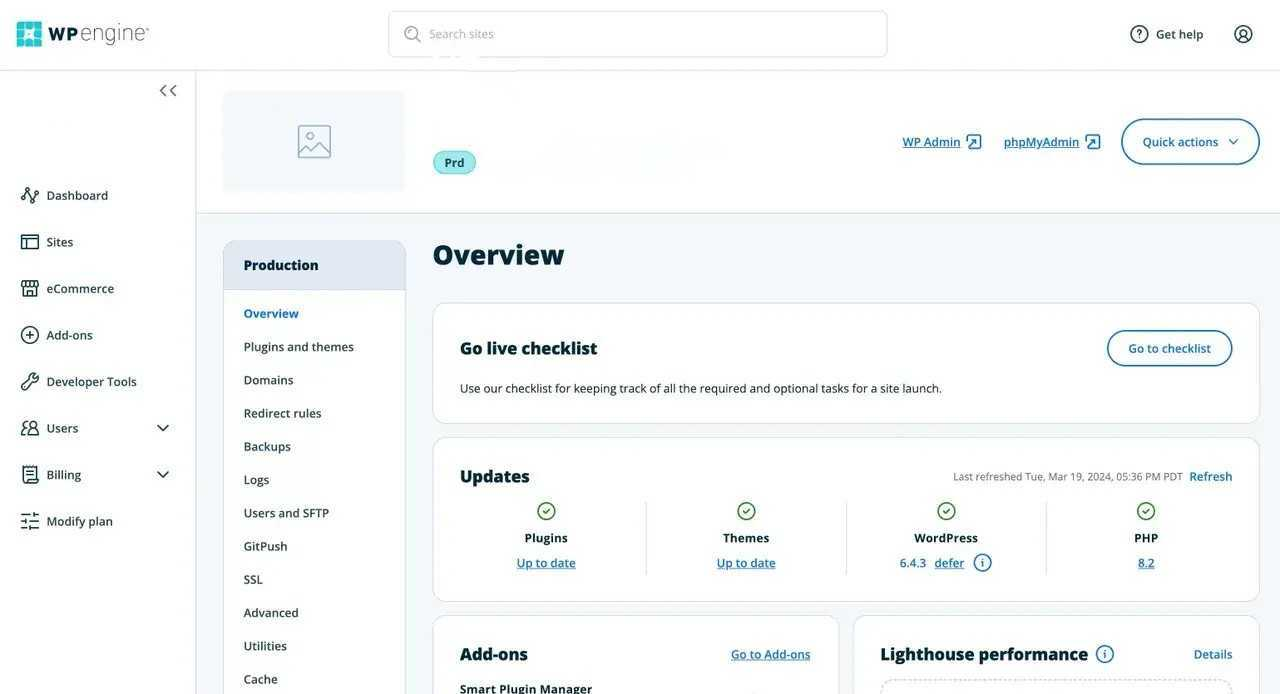
WP Engine, on the other hand, offers a custom dashboard specifically optimized for WordPress users. It is clean, intuitive, and highly accessible for a wide range of users, prioritizing usability and efficiency. The panel includes essential features such as backups, staging environments, and developer tools. This focus on WordPress management offers a tailored experience for website administrators, whether they are seasoned developers or beginners.
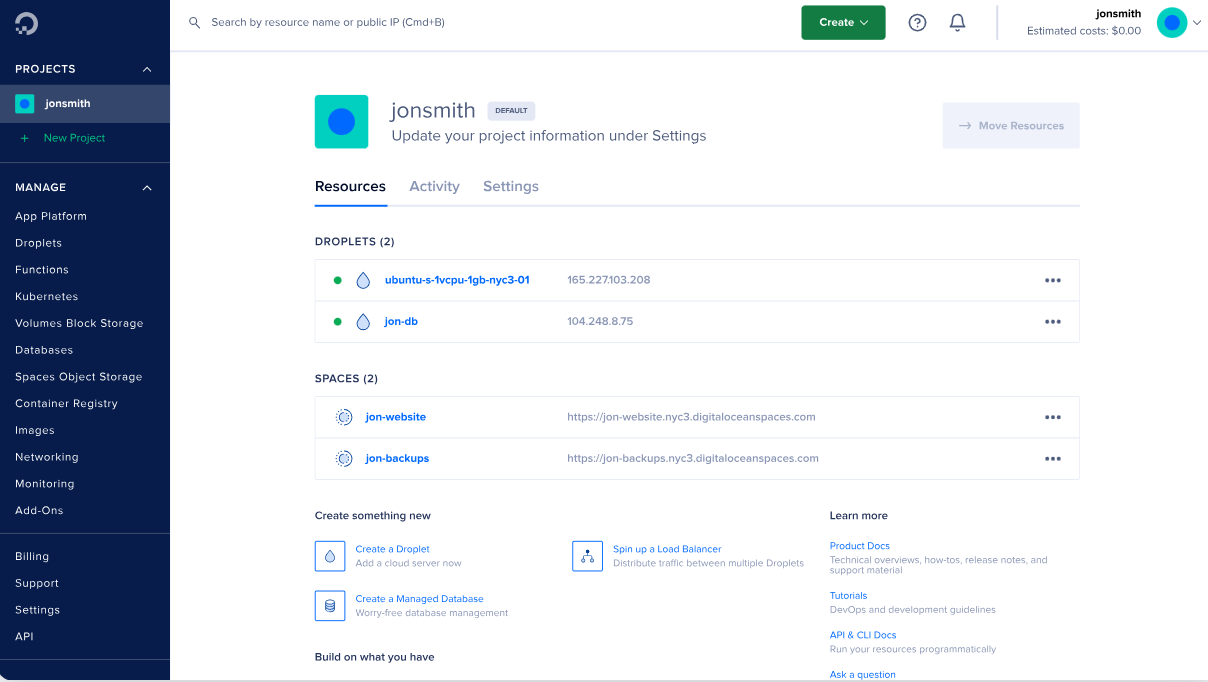
Both DigitalOcean and WP Engine offer migration services for websites, but their approaches and costs differ. DigitalOcean provides various migration options, including preconfigured 1-Click Apps for quick deployment. While DigitalOcean navigates users through the migration process with their extensive documentation and the Droplets system, it may require a bit more manual setup compared to WP Engine’s Automated Migration plugin. WP Engine’s plugin simplifies the process substantially, allowing users to move their sites effortlessly at no additional cost. WP Engine also offers manual migration checklists and 24/7 support to help resolve any issues during the transition.
The platforms provide extensive knowledge bases filled with guides, how-to articles, and instructional content. DigitalOcean’s help center comprises comprehensive documentation, tutorials, and community support that are highly informative, yet could be overwhelming for beginners. The array of available resources ensures that users have the required information and assistance when needed. WP Engine offers an extensive Support Center with step-by-step guides, troubleshooting articles, and 24/7 live support. The resources available are particularly beneficial for WordPress-related queries, making the support more focused and efficient for users.
User management
accessibility.
Score Components:
- Role customization (40%): Flexibility in creating and defining user roles and
permissions. - Ease of management (30%): User interface and tools for managing users.
- Access control (20%): Effectiveness of access control measures for different user
levels. - Scalability (10%): Ability to manage a growing number of users efficiently.
 8.0
8.0
 8.8
8.8
🏆 Winner
WP Engine: A top-notch solution for comprehensive user management in web hosting.
DigitalOcean and WP Engine both offer robust user management functionalities, but they differ in the flexibility and variety they provide. DigitalOcean supports simple role structures with Owner, Biller, and Member roles, each having defined access levels and permissions. On the other hand, WP Engine offers a more nuanced approach with multiple user roles that split rights more granularly, especially with the addition of “Partial” roles that can be tweaked for environment-specific permissions. This additional granularity offers more flexibility for large teams or companies with diverse user needs.
DigitalOcean’s user management interface is straightforward, focusing on ease of inviting new members and managing them through an intuitive membership table. Team owners can see detailed sign-in methods, which adds an element of security. WP Engine provides a comprehensive User Portal where users can easily be added, edited, and removed. The inclusion of specific features like checklists for partial users to choose environments enhances tailored access and management capabilities. The detailed account activity logs are particularly helpful for tracking user actions.
Access control measures on both platforms ensure safe and efficient user management. DigitalOcean allows team owners to dynamically adjust roles, providing a clear way to monitor and manage user access. WP Engine, however, excels with more extensive access control, allowing granular modifications to user roles and detailed logging of user activities. This is particularly critical for growing teams needing precise control over who accesses specific environments and resources.
DigitalOcean user roles table:
| Role | Description | Access highlights |
|---|---|---|
| Owner | Full control over resources, billing, and team settings. | Manage and access all shared resources, billing settings, and team configurations. |
| Biller | Handles billing info only. | View and modify billing information. |
| Member | Access to shared resources. | Full access to use, modify, and deploy resources. |
WP Engine user roles table:
| Role | Description | Access highlights |
|---|---|---|
| Owner | Full administrative access over User Portal, billing, and site management. | Manage all aspects including user roles, site transfers, billing, and advanced settings. |
| Full (with Billing) | Can make billing changes and manage site transfers. | Access to billing, site transfers, and Smart Plugin Manager. |
| Full (no Billing) | Limited to managing sites and environments without billing changes. | Access to manage Smart Plugin Manager and site settings. |
| Partial (with Billing) | Access to specified environments and billing changes. | Manage billing, start site transfers, promote transferable sites in specific environments. |
| Partial (no Billing) | Restricted to designated environments with no billing access. | Modify and manage specific environments without initiating site transfers or billing changes. |
Customer support
hosting provider.
Score Components:
- Support communication channels (30%): Measures the variety of customer support types
provided (live chat, chatbot, email, phone, etc.) - Availability (20%): Assesses the availability hours for each channel, including 24/7
support options. - Technical support quality (30%): Assesses whether the provider offers comprehensive
technical support, including hardware upgrades (e.g., HDD to SSD), software installations, and web
server configuration changes. - Enterprise support (20%): Checks if there are dedicated or priority support services
for enterprise-level customers.
 7.8
7.8
 8.9
8.9
🏆 Winner
WP Engine: The platform scores higher in customer support evaluation, showing strength in all categories, particularly in availability and the range of communication channels.
 |
 |
|
|---|---|---|
Phone support |
||
Live chat support |
||
Chatbot |
||
Email/ticket support |
||
Enterprise support (dedicated agent, priority support) |
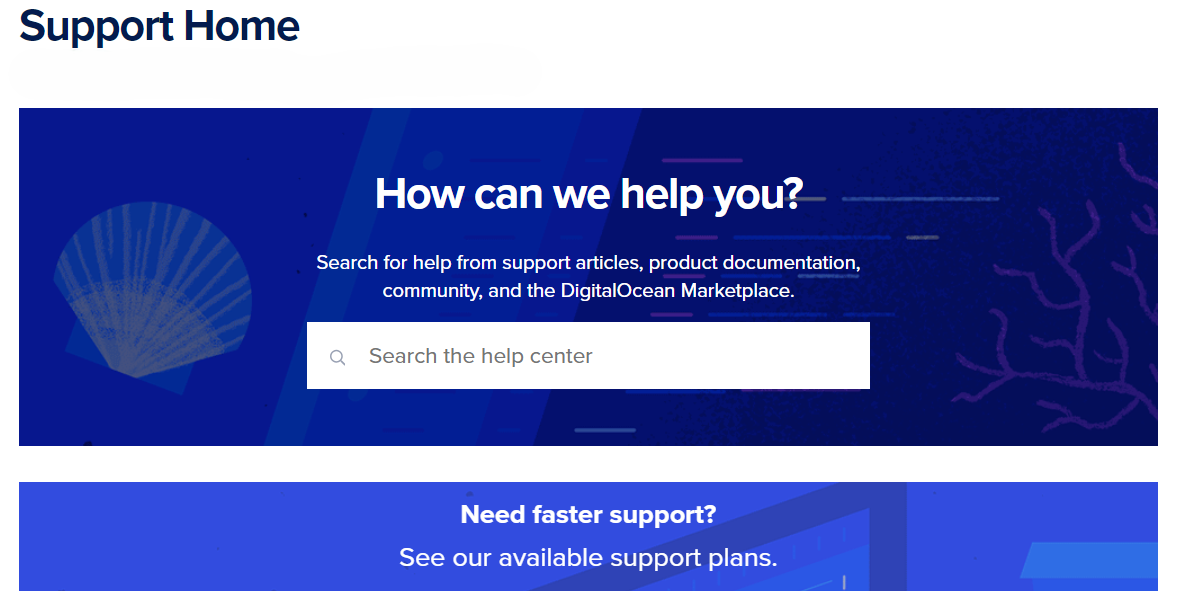
DigitalOcean and WP Engine both provide email and ticket support, but the manner and depth of their services vary. DigitalOcean offers basic support through a ticketing system and premium live chat, while their extensive documentation and community forums are valuable for self-service troubleshooting. WP Engine, on the other hand, elevates support with 24/7 phone and chat access, underscoring their commitment to constant availability and ease of reaching skilled WordPress experts.
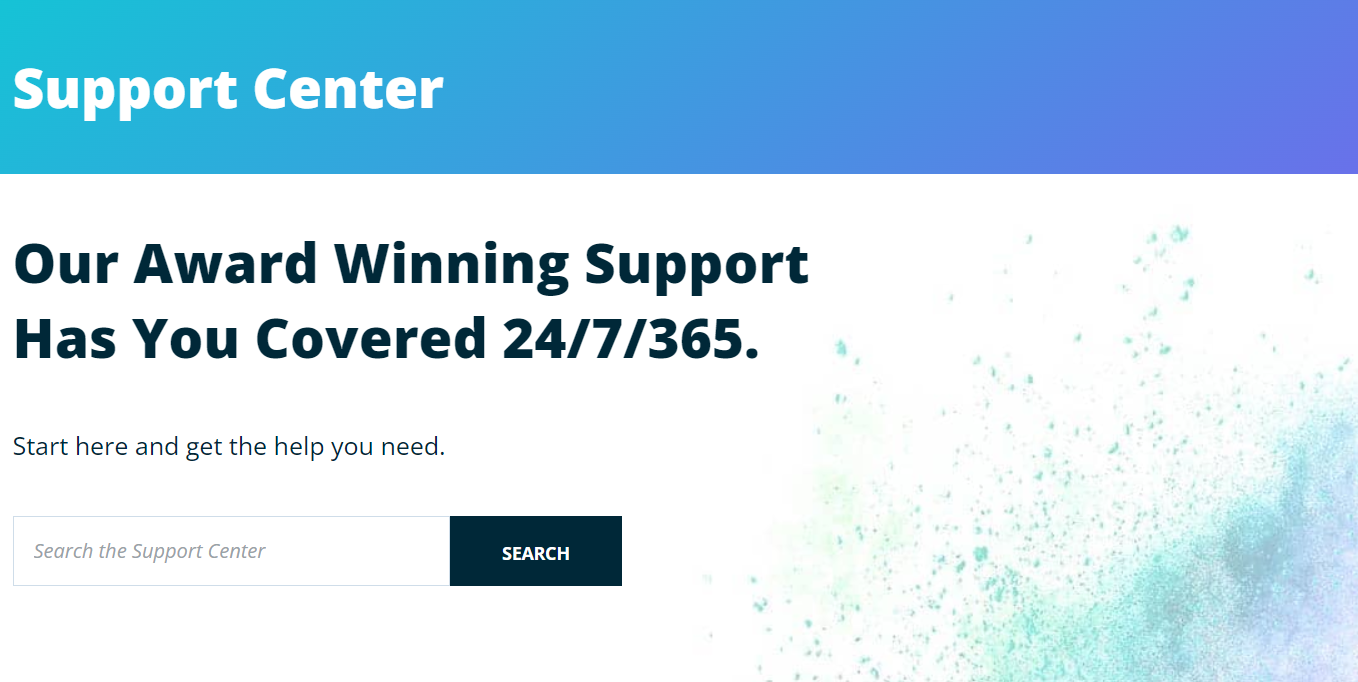
WP Engine shines with its tailored approach, offering dedicated phone support and chat services for all clients, ensuring that users can quickly resolve issues. DigitalOcean’s support, although comprehensive, largely relies on written communication tools like emails and tickets, supplemented by documentation and tutorials for self-help. Both platforms offer premium enterprise support options, yet WP Engine’s consistent 24/7 live support and higher customer satisfaction rating make it the preferable choice for many users.
Digital Ocean vs WP Engine: User feedback
DigitalOcean consistently garners praise for its simplicity, user-friendly interface, and transparent pricing, making it ideal for both beginners and experienced developers. Users appreciate the straightforward setup, reliable performance, and excellent customer support, highlighting features like one-click deployment and robust documentation. However, there are some minor criticisms, including a limited variety of server configurations compared to larger providers and occasional slow customer support response times. Despite these drawbacks, DigitalOcean is highly regarded for its cost-effectiveness, ease of use, and overall reliability, particularly for small to medium-sized businesses and startups.
WP Engine exudes excellence in managed WordPress hosting, boasting top-notch technical support that’s often highlighted as a standout feature. Users appreciate the user-friendly dashboard, seamless migration tools, daily backups, and solid security measures, all of which contribute to high performance and reliability. However, the service does come at a higher price point, which some users find steep, especially for entry-level plans or smaller projects. Despite occasional concerns about costs and some technical nuances, WP Engine’s premium service quality justifies the expense for many, making it a highly recommended solution for businesses and developers alike.
Digital Ocean vs WP Engine: FAQ
Which platform is better suited for hosting WordPress websites?
WP Engine is better suited for hosting WordPress websites due to its specialization in WordPress hosting, providing optimized performance, security measures, and developer tools. Its EverCache® technology enhances page load times, and it includes proactive security measures and excellent customer support. While DigitalOcean also supports WordPress, WP Engine’s various offerings specifically tailored for WordPress users make it the preferable option.
Which hosting service offers better security features?
DigitalOcean and WP Engine both offer robust security features, but WP Engine has the edge with specialized WordPress security measures like managed core updates, DDoS mitigation, and automated plugin updates. DigitalOcean also provides strong security with data encryption, DDoS protection, and cloud firewalls. However, WP Engine’s proactive threat detection and real-time security management add an extra layer of confidence, especially for WordPress users.
Which platform offers better customer support?
WP Engine offers better customer support compared to DigitalOcean. WP Engine provides 24/7 live assistance via chat and phone, which is particularly helpful for WordPress-related issues and ensures consistent, expert-level support. DigitalOcean offers email and ticket-based support alongside its comprehensive documentation and community support, but the instant availability and specialized expertise of WP Engine’s support team make it superior in this area.
Which hosting service offers more scalability options for growing websites?
Both DigitalOcean and WP Engine offer robust scalability options, but their approaches differ. DigitalOcean enables horizontal scaling and load balancing through its Droplet system, allowing users to manually configure resources for traffic surges. WP Engine focuses on scalable architecture with isolated resources optimized for performance, making it easier to handle traffic growth seamlessly, particularly for WordPress sites. Thus, WP Engine’s managed environment likely provides a more seamless experience for scaling.
What are the major differences in pricing and value between DigitalOcean and WP Engine?
DigitalOcean provides more economical options starting at $4/month for website and WordPress hosting with various VPS plans and performance options. WP Engine, focusing exclusively on managed WordPress hosting, starts at $20/month and includes robust support, SSL, backups, and premium themes. DigitalOcean’s pricing is beneficial for users seeking customization and lower costs, while WP Engine offers specialized WordPress services with higher visit allowances and premium customer support, catering to different user needs.
The making of this blog
We followed a clear, step-by-step process to write and research this article.








